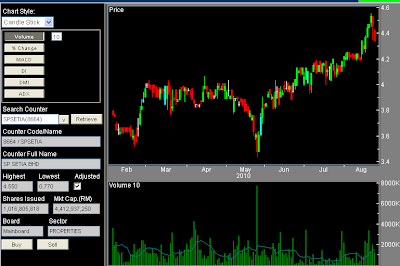The Business Times posted an interesting article on the skybus service possibly expanding its services to Bandar Utama and Sunway.
"We have ferried more than 4.5 million passengers since LCCT was opened on March 23 2006," he said.
After one-and-a half years of service, SkyBus - which is one of two LCCT bus service providers operating from KL Sentral - was appointed as budget airline AirAsia Bhd's official bus.
The tie-up has enabled AirAsia passengers to enjoy an online bus fare of RM6.50 for one-way trip, instead of the normal RM9 one-way ticket.
SkyBus is now looking at carrying passengers from Bandar Utama to LCCT.
Chris said the service will start in the second quarter this year.
He said the company has also received invitation letters from the management of Sunway Pyramid and Genting Theme Park as well as other bus terminals to transport budget airlines passenger from their terminals.
Currently, SkyBus controls 20 per cent of traffic to LCCT. With more routes being opened in Klang Valley, its market share its expected to increase.
I've taken the economical route of going to kl sentral, sitting on the bus to the LCCT, and taking one of Air Asia's cheap flights to Penang.
Basically it costs me RM9.00 for the bus, RM15 for the taxi, and some 60 bucks for the flight. So this comes out to about RM85 for the entire trip. Not only do we have to consider the financial impact, but the opportunity cost in time taken. We're talking about 3.5 hours for a trip to Penang which normally takes about 4 hours to drive, not a great bargain there. (1 hour bus ride, 30 min taxi ride, 1 hour flight wait, 1 hour travel time)
High speed trains have a couple of interesting advantages that I only realized because of how ridiculous the costs I paid to get to the the airport in terms of time and money spent.
First and foremost, the high speed trains will most likely stop right in the middle of the city, at KL Sentral, so the only extra cost paid for is the taxi ride to the station. The bus trip is cut out, saving some one hour of time. You get to the train station 30 min before, one hour later you are in Penang or Singapore. (20 min taxi ride, 30 min wait for train, 1 hour travel = 2 hours of time spent)
In Singpore the train would arrive at a more convenient location so you would save on time spent traveling from the Singapore airport to your place of abode. Taxi costs in Penang are also outrageous, so you would save on costs there as well.
High speed trains have their demand for places with a 1-2 hour flight time. A 3.5 hour ordeal to fly to Singapore or Penang is quite ridiculous given that it equates to roughly half a working day. On the other hand, 2 hour travel time for train is much more tolerable. People commute 1 hour to work anyways, what is an extra hour?


























